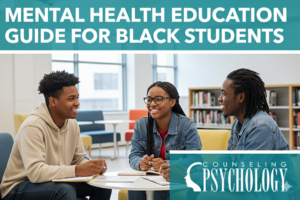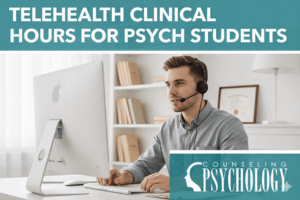Explore the Best Master’s Degrees in Clinical Mental Health Counseling Near New Orleans

New Orleans and the surrounding Southeast Louisiana region present a unique set of mental health challenges and opportunities, from disaster recovery to cultural resiliency, urban stressors, and underserved communities. For students who wish to build a counseling career in this area, choosing a Master's in Clinical Mental Health Counseling (CMHC) that aligns with local needs and Louisiana licensing regulations is a strategic decision.
In This Article, You'll Learn:
- What to look for in a quality Clinical Mental Health Counseling master's program in New Orleans
- How Louisiana's LPC licensure process works, including supervised hours and required exams
- Where local students typically complete practicum and internship training
- Key admissions requirements and curriculum topics covered in most CMHC degrees
- Why training and practicing in the New Orleans region offers unique professional advantages
2026 Best Master's in Clinical Mental Health Counseling Programs Near New Orleans
University of Holy Cross
New Orleans, LA - Private 4-year - uhcno.edu
Master's - Counseling (Clinical Mental Health Counseling)
Online Learning - Visit Website
The University of Holy Cross provides a CACREP-accredited Master of Arts in Counseling with a Clinical Mental Health Counseling concentration, delivered entirely online over three years. This Roman Catholic-affiliated program requires no entrance exam and emphasizes hands-on experience through 700+ clinical hours and intensive residencies. Students develop advanced counseling skills while benefiting from flexible coursework, research presentation opportunities at national conferences, and multiple specialization options. Graduates emerge as competent professionals prepared to address complex mental health issues across diverse populations, with a minimum 3.0 undergraduate GPA required for admission.
- CACREP-accredited counseling program
- Fully online with residency components
- 700+ clinical experience hours
- Three-year flexible completion
- Multiple specialization options
- Minimum 3.0 undergraduate GPA
- Research presentation opportunities
- Professional conference involvement
Loyola University New Orleans
New Orleans, LA - Private 4-year - loyno.edu
Master's - Master of Science in Counseling - Clinical Mental Health Counseling
Online & Campus Based - Visit Website
Loyola University New Orleans offers a Master of Science in Counseling with a Clinical Mental Health Counseling focus, delivered in a hybrid format. This 60-credit program emphasizes evidence-based practice through a science-practitioner model, preparing students for licensure as Licensed Professional Counselors. It includes 740 clinical training hours, enabling hands-on experience with diverse populations across age groups and cultural backgrounds. The curriculum covers assessment, diagnosis, and treatment of mental disorders, with electives for specialization and a strong social justice orientation. An entrance exam is not required for admission, aligning with the program's accessible approach to graduate education.
- 60-credit comprehensive program
- 740 clinical training hours
- Science-practitioner learning model
- Licensure preparation (LPC)
- Multiple theoretical orientations
- Diverse client population training
- Social justice paradigm
- Hybrid program format
University of New Orleans
New Orleans, LA - Public 4-Year - new.uno.edu
Master's - Master of Education in Counseling (Clinical Mental Health Counseling)
Campus Based - Visit Website
The University of New Orleans' Master of Education in Counseling with a Clinical Mental Health Counseling concentration is a 60-credit CACREP-accredited program preparing students for Louisiana LPC licensure. It requires a 100-hour practicum and 600-hour internship in mental health settings. Evening and late afternoon classes accommodate working professionals, with part-time options available. The program does not require entrance exams. Graduates pursue careers in agencies, schools, and clinical environments, with scholarships offered to eligible students.
- 60 credit hours
- CACREP accredited
- Evening classes
- 100-hour practicum
- 600-hour internship
- Prepares for LPC licensure
- Scholarships available
- Part-time option
- Clinical Mental Health focus
- Late afternoon classes
Louisiana State University Health Sciences Center-New Orleans
New Orleans, LA - Public 4-Year - lsuhsc.edu
Master's - Master of Health Sciences in Clinical Mental Health Counseling
Campus Based - Visit Website
Louisiana State University Health Sciences Center-New Orleans offers a CACREP-accredited Master of Health Sciences in Clinical Mental Health Counseling. This 60-credit campus program develops advanced counseling competencies through rigorous coursework and practical training, preparing graduates for NCE certification and licensure. Students gain skills to serve diverse populations with mental, physical, and emotional challenges in community, private practice, and nonprofit settings. Admission requires a minimum 2.5 undergraduate GPA and two recommendation letters, with a comprehensive exam as part of the program requirements. The program does not require an entrance exam.
- CACREP fully accredited program
- 60 credit hour graduate degree
- On-campus classroom instruction
- Prepares for NCE certification
- Diverse counseling competency focus
- Minimum 2.5 undergraduate GPA
- Two recommendation letters required
- Professional counseling orientation
- Comprehensive exam requirement
- Clinical mental health focus
What Makes a Strong CMHC Master's Program
Here are the must-haves when evaluating master's options:
- Accreditation (especially CACREP). A program accredited by the Council for Accreditation of Counseling and Related Educational Programs helps ensure your degree meets professionally accepted standards.
- Robust curriculum + clinical experience. The program should include core counseling domains and offer structured practicum/internship components.
- Clear licensure alignment. Check whether the coursework and supervised hours map to Louisiana's Licensed Professional Counselor (LPC) Board requirements.
- Local clinical partnerships. Programs with established relationships in the New Orleans area (mental health centers, hospitals, nonprofits) facilitate better placement support.
- Flexible delivery formats. Because many students work or have family obligations, programs that offer part-time, evening, hybrid, or online options are advantageous.
Unique Regional Considerations for New Orleans Students
When studying in or near New Orleans, these factors become particularly important:
- Proximity to placement sites. You'll want ease of travel to agencies in Orleans, Jefferson, St. Bernard, Plaquemines, and neighboring parishes.
- Faculty knowledge of regional trauma/disaster work. Given New Orleans's history, some programs emphasize disaster recovery, trauma-informed care, and community resilience.
- Cultural competency in diverse communities. Courses addressing race, poverty, migration, and cultural identity are essential in the New Orleans context.
- Access to Louisiana-focused licensure support. Programs based in Louisiana are more likely to integrate licensing guidance, local supervisor networks, and state board rules.
- Scholarships and in-state benefits. Local students may find more opportunities for assistantships or tuition advantages in Louisiana-based programs.
Learn more about counseling schools in Louisiana.
CMHC Admissions & Curriculum Snapshot
Here's a typical picture of what admissions and academic structure looks like in CMHC programs:
General Admissions Requirements:
- Bachelor's degree (accredited institution)
- Minimum undergrad GPA (often ~3.0)
- Letters of recommendation (2–3)
- Personal statement / statement of purpose
- Resume or CV
- GRE scores (some schools require, others waive)
Core Coursework & Clinical Training Example
| Domain / Component | Sample Courses or Elements |
| Ethics & Professional Issues | Counseling Ethics, Professional Orientation |
| Theories & Techniques | Cognitive-behavioral, Person-centered, Systems |
| Assessment & Diagnosis | Psychopathology, DSM, Testing / Appraisal |
| Group Counseling | Group process, leadership, dynamics |
| Multicultural & Social Justice | Cultural competency, inclusion, systemic factors |
| Research & Program Evaluation | Statistics, outcome evaluation, evidence-based practice |
| Career / Vocational | Career theory, assessment tools, transitions |
| Practicum & Internship | Supervised clinical placements in mental health |
Clinical Hour Benchmarks (typical):
- Practicum: ~100 clock hours (including direct client contact)
- Internship: ~600 or more clock hours across two semesters
- Supervision: both individual and group supervision
Time to Completion:
- 2 years (full time)
- 3–4+ years (part time)
Licensing & Career Path in Louisiana
Choosing a program that aligns with state licensure rules is critical. Here's how the Louisiana LPC process works:
Louisiana LPC Licensure Requirements
| Requirement | Details |
| Graduate degree | 60 graduate semester hours (or equivalent), focused on professional mental health counseling and meeting Louisiana board standards. |
| Supervised experience hours | 3,000 hours post-master's under a board-approved supervisor over at least 24 months. |
| Composition of hours | At least 1,900 direct client contact hours, up to ~1,000 indirect, and minimum ~100 face-to-face supervision hours. |
| Graduate internship credit | Up to 500 hours of indirect contact may be credited per 30 graduate credits beyond the master's degree. |
| Examination | Must pass either the National Counselor Exam (NCE) or National Clinical Mental Health Counseling Exam (NCMHCE). |
| Licensing board application | Submit experience documentation, exam scores, declarations, and fees to Louisiana LPC Board. |
| Continuing education | LPCs must complete 40 CE hours every two years (including ethics, diagnosis, etc.). |
In summary, after completing your CMHC master's, you'll apply for a Provisional Licensed Professional Counselor (PLPC) license and begin accruing supervised hours. Once the 3,000 hours, required supervision, and exam are completed, you may apply for full LPC status.
Graduates may work in mental health agencies, crisis centers, hospitals, private practice, school systems, nonprofit organizations, or community clinics.
Local Clinical Training in New Orleans
One of the greatest advantages of studying locally is access to real-world training environments tailored to the region's needs. Clinical mental health counseling students can often complete their training in community centers, substance use and recovery programs, hospital and medical center behavioral health departments, school-based counseling settings, faith-based or multicultural outreach clinics, and more.
Potential Placement Settings in the New Orleans Region
| Agency / Clinic | Location / Parish | Counseling Services Offered | Notes for Interns / Students |
| MHSD Behavioral Health Centers | Orleans, St. Bernard, Plaquemines | Community mental health | Multiple branch centers, diverse client base |
| LSU Health Child & Family Counseling Clinic | New Orleans | Child, adolescent, family therapy | Teaching clinic, supervision by faculty |
| DePaul Community Health Centers | Various New Orleans sites | Counseling, case management | Community health setting, accepts interns |
| Loyola Center for Counseling & Education | New Orleans | Sliding-scale individual & group therapy | Training site, hands-on experience |
| Leeke Magee Christian Counseling Center | Greater New Orleans | Individual, couples, family counseling | Student‑supervised, faith-based orientation |
Training in these environments allows you to:
- Work with diverse populations (race, culture, socioeconomic status)
- Gain experience in post-disaster and trauma-informed settings
- Build a local network of supervisors and referral agencies
- Position yourself for employment in the very region you want to serve
Tips for Prospective Students
- Confirm that a program meets Louisiana LPC Board requirements before enrolling.
- Ask about practicum and internship placements in New Orleans-area agencies.
- Connect with local licensed supervisors (LPC-S) early to arrange post-graduate supervision.
- Seek local scholarships or tuition incentives for Louisiana residents or regional practitioners.
Frequently Asked Questions (FAQs)
Q: Do I need to attend a program in Louisiana to become licensed there?
A: No, but you must ensure that the out-of-state or online program is regionally accredited and that its curriculum and practicum components satisfy Louisiana LPC Board requirements.
Q: How many direct client contact hours are required in Louisiana?
A: Of the 3,000 post-master's supervised hours, Louisiana requires at least 1,900 hours of direct client contact.
Q: Can my internship hours as a graduate student count toward those 3,000 hours?
A: Yes, up to 500 hours of indirect client contact may be credited if they come from graduate-level coursework beyond the degree and are approved by the Board.
Q: How many continuing education hours are needed to maintain LPC licensure?
A: LPCs in Louisiana must complete 40 continuing education hours every two years, including specific hours in ethics, diagnosis, and other required areas.



